
Introducing Question 3 in AP® English Literature
by Michelle Lindsey
I love teaching Question 3, the Literary Argument Essay, of the AP English Literature Exam . I thoroughly enjoy seeing one beautifully written novel wrapped into a pretty little package that is the essay. My students always tell me my enthusiasm is nauseating, but to be able to eloquently condense a rich novel into such a narrow lens, is an art form.
I never want to wait until an entire novel is read before introducing this prompt. Sure, the students read novels in AP English Language so I could always pull from last year’s texts to introduce this question, but sometimes I get new kids that didn’t take AP English Language… or who haven’t read a novel recently enough to remember it.
Because of this, I turn to movies so that I can jump into question 3 early in the year and satisfy my hopes and dreams.
Here’s why:
- Context My go-to is Jurassic Park. Although now, with all the remakes, the students get very upset when I don’t pinpoint one particular film title. Or I let them choose. Either way, the students have enough context to write this essay. One person I know (and by “know” I mean me) has watched, “The Greatest Showman” more than 14 times and can recite every line. Quiz me, it’s an addiction. The soundtrack is in my CD player in my car. I can honestly say I have not read any novel 14 times, not even 4 times. Ok, I have probably read Life of Pi 4 times. But I don’t need to rely on students reading an entire novel, I can offer them a list of movies (like the suggested list on the AP Exam) or, they can pull from their brain. It’s fast and easy and the students enjoy debating which movie would be best for the given prompt.
- Memory I always spring this activity on them. I don’t want them to study a film in order to do this activity. Instead, I want to see how well they remember the nuances within these films from their memories. I want to see how well they remember the complex relationship like that between Dory and Marlin in “Finding Nemo.” Do they remember that Dory teaches Marlin to enjoy life just a little more even though he is on this frantic hunt to find his son? And, if they can manage to remember that, can they remember specific enough details within the plot to prove their point?
- Scaffolding Movies are great scaffolding tools. Some of my students say (more like complain rather loudly) that tackling an entire novel in an essay sounds daunting. I suppose it is why movies are an excellent stepping stone. It offers them solid practice without the burden of adding rich literature to it. When I ask my students to recall a character from a book with a complicated family life, they just stare at me. If I ask them to recall a character with a complicated family life within a movie and I can’t get them to stop providing examples, it’s beautiful chaos that I embrace.
- Analysis vs. Summary This is one of the biggest reasons why I start with movies. This rationale paired with the scaffolding technique is key. Writing about movies is an excellent way to move those kids beyond summary. I always tell them, “Don’t you dare explain the plotline of ‘The Greatest Showman’ to me. I know that plot better than anyone.” That’s when I direct them to teach me something. Teach me a perspective or interpretation or significant theme that I may have missed.
Introducing the Literary Argument Essay to AP English Literature students can be challenging. Using movies helps them to practice a new skill with a medium they may be more comfortable with.
For more advice on creative ways of teaching AP English Literature, check out this article about great digital tools for teaching this course.
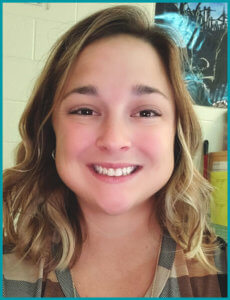
Michelle Lindsey has been a high school teacher in Florida for nine years, and currently teaches AP ® Capstone as well as literature and writing courses .

Please read Marco Learning’s Terms and Conditions, click to agree, and submit to continue to your content.
Please read Marco Learning’s Terms and Conditions, click to agree, and submit at the bottom of the window.
MARCO LEARNING TERMS OF USE
Last Modified: 1/24/2023
Acceptance of the Terms of Use
These terms of use are entered into by and between You and Marco Learning LLC (“ Company “, “ we “, or “ us “). The following terms and conditions (these “ Terms of Use “), govern your access to and use of Marco Learning , including any content, functionality, and services offered on or through Marco Learning (the “ Website “), whether as a guest or a registered user.
Please read the Terms of Use carefully before you start to use the Website. By using the Website or by clicking to accept or agree to the Terms of Use when this option is made available to you, you accept and agree to be bound and abide by these Terms of Use. You may not order or obtain products or services from this website if you (i) do not agree to these Terms of Use, or (ii) are prohibited from accessing or using this Website or any of this Website’s contents, goods or services by applicable law . If you do not want to agree to these Terms of Use, you must not access or use the Website.
This Website is offered and available to users who are 13 years of age or older, and reside in the United States or any of its territories or possessions. Any user under the age of 18 must (a) review the Terms of Use with a parent or legal guardian to ensure the parent or legal guardian acknowledges and agrees to these Terms of Use, and (b) not access the Website if his or her parent or legal guardian does not agree to these Terms of Use. By using this Website, you represent and warrant that you meet all of the foregoing eligibility requirements. If you do not meet all of these requirements, you must not access or use the Website.
Changes to the Terms of Use
We may revise and update these Terms of Use from time to time in our sole discretion. All changes are effective immediately when we post them, and apply to all access to and use of the Website thereafter.
These Terms of Use are an integral part of the Website Terms of Use that apply generally to the use of our Website. Your continued use of the Website following the posting of revised Terms of Use means that you accept and agree to the changes. You are expected to check this page each time you access this Website so you are aware of any changes, as they are binding on you.
Accessing the Website and Account Security
We reserve the right to withdraw or amend this Website, and any service or material we provide on the Website, in our sole discretion without notice. We will not be liable if for any reason all or any part of the Website is unavailable at any time or for any period. From time to time, we may restrict access to some parts of the Website, or the entire Website, to users, including registered users.
You are responsible for (i) making all arrangements necessary for you to have access to the Website, and (ii) ensuring that all persons who access the Website through your internet connection are aware of these Terms of Use and comply with them.
To access the Website or some of the resources it offers, you may be asked to provide certain registration details or other information. It is a condition of your use of the Website that all the information you provide on the Website is correct, current, and complete. You agree that all information you provide to register with this Website or otherwise, including but not limited to through the use of any interactive features on the Website, is governed by our Marco Learning Privacy Policy , and you consent to all actions we take with respect to your information consistent with our Privacy Policy.
If you choose, or are provided with, a user name, password, or any other piece of information as part of our security procedures, you must treat such information as confidential, and you must not disclose it to any other person or entity. You also acknowledge that your account is personal to you and agree not to provide any other person with access to this Website or portions of it using your user name, password, or other security information. You agree to notify us immediately of any unauthorized access to or use of your user name or password or any other breach of security. You also agree to ensure that you exit from your account at the end of each session. You should use particular caution when accessing your account from a public or shared computer so that others are not able to view or record your password or other personal information.
We have the right to disable any user name, password, or other identifier, whether chosen by you or provided by us, at any time in our sole discretion for any or no reason, including if, in our opinion, you have violated any provision of these Terms of Use.
Intellectual Property Rights
The Website and its entire contents, features, and functionality (including but not limited to all information, software, text, displays, images, graphics, video, other visuals, and audio, and the design, selection, and arrangement thereof) are owned by the Company, its licensors, or other providers of such material and are protected by United States and international copyright, trademark, patent, trade secret, and other intellectual property or proprietary rights laws. Your use of the Website does not grant to you ownership of any content, software, code, date or materials you may access on the Website.
These Terms of Use permit you to use the Website for your personal, non-commercial use only. You must not reproduce, distribute, modify, create derivative works of, publicly display, publicly perform, republish, download, store, or transmit any of the material on our Website, except as follows:
- Your computer may temporarily store copies of such materials in RAM incidental to your accessing and viewing those materials.
- You may store files that are automatically cached by your Web browser for display enhancement purposes.
- You may print or download one copy of a reasonable number of pages of the Website for your own personal, non-commercial use and not for further reproduction, publication, or distribution.
- If we provide desktop, mobile, or other applications for download, you may download a single copy to your computer or mobile device solely for your own personal, non-commercial use, provided you agree to be bound by our end user license agreement for such applications.
- If we provide social media features with certain content, you may take such actions as are enabled by such features.
You must not:
- Modify copies of any materials from this site.
- Use any illustrations, photographs, video or audio sequences, or any graphics separately from the accompanying text.
- Delete or alter any copyright, trademark, or other proprietary rights notices from copies of materials from this site.
You must not access or use for any commercial purposes any part of the Website or any services or materials available through the Website.
If you wish to make any use of material on the Website other than that set out in this section, please contact us
If you print, copy, modify, download, or otherwise use or provide any other person with access to any part of the Website in breach of the Terms of Use, your right to use the Website will stop immediately and you must, at our option, return or destroy any copies of the materials you have made. No right, title, or interest in or to the Website or any content on the Website is transferred to you, and all rights not expressly granted are reserved by the Company. Any use of the Website not expressly permitted by these Terms of Use is a breach of these Terms of Use and may violate copyright, trademark, and other laws.
Trademarks, logos, service marks, trade names, and all related names, logos, product and service names, designs, and slogans are trademarks of the Company or its affiliates or licensors (collectively, the “ Trademarks ”). You must not use such Trademarks without the prior written permission of the Company. All other names, logos, product and service names, designs, and slogans on this Website are the trademarks of their respective owners.
Prohibited Uses
You may use the Website only for lawful purposes and in accordance with these Terms of Use. You agree not to use the Website:
- In any way that violates any applicable federal, state, local, or international law or regulation (including, without limitation, any laws regarding the export of data or software to and from the US or other countries).
- For the purpose of exploiting, harming, or attempting to exploit or harm minors in any way by exposing them to inappropriate content, asking for personally identifiable information, or otherwise.
- To send, knowingly receive, upload, download, use, or re-use any material that does not comply with the Content Standards set out in these Terms of Use.
- To transmit, or procure the sending of, any advertising or promotional material, including any “junk mail”, “chain letter”, “spam”, or any other similar solicitation.
- To impersonate or attempt to impersonate the Company, a Company employee, another user, or any other person or entity (including, without limitation, by using email addresses or screen names associated with any of the foregoing).
- To engage in any other conduct that restricts or inhibits anyone’s use or enjoyment of the Website, or which, as determined by us, may harm the Company or users of the Website or expose them to liability.
Additionally, you agree not to:
- Use the Website in any manner that could disable, overburden, damage, or impair the site or interfere with any other party’s use of the Website, including their ability to engage in real time activities through the Website.
- Use any robot, spider, or other automatic device, process, or means to access the Website for any purpose, including monitoring or copying any of the material on the Website.
- Use any manual process to monitor or copy any of the material on the Website or for any other unauthorized purpose without our prior written consent.
- Use any device, software, or routine that interferes with the proper working of the Website.
- Introduce any viruses, Trojan horses, worms, logic bombs, or other material that is malicious or technologically harmful.
- Attempt to gain unauthorized access to, interfere with, damage, or disrupt any parts of the Website, the server on which the Website is stored, or any server, computer, or database connected to the Website.
- Attack the Website via a denial-of-service attack or a distributed denial-of-service attack.
- Otherwise attempt to interfere with the proper working of the Website.
If you use, or assist another person in using the Website in any unauthorized way, you agree that you will pay us an additional $50 per hour for any time we spend to investigate and correct such use, plus any third party costs of investigation we incur (with a minimum $300 charge). You agree that we may charge any credit card number provided for your account for such amounts. You further agree that you will not dispute such a charge and that we retain the right to collect any additional actual costs.
User Contributions
The Website may contain message boards, chat rooms, personal web pages or profiles, forums, bulletin boards, and other interactive features (collectively, “ Interactive Services “) that allow users to post, submit, publish, display, or transmit to other users or other persons (hereinafter, “ post “) content or materials (collectively, “ User Contributions “) on or through the Website.
All User Contributions must comply with the Content Standards set out in these Terms of Use.
Any User Contribution you post to the site will be considered non-confidential and non-proprietary. By providing any User Contribution on the Website, you grant us and our affiliates and service providers, and each of their and our respective licensees, successors, and assigns the right to use, reproduce, modify, perform, display, distribute, and otherwise disclose to third parties any such material for any purpose.
You represent and warrant that:
- You own or control all rights in and to the User Contributions and have the right to grant the license granted above to us and our affiliates and service providers, and each of their and our respective licensees, successors, and assigns.
- All of your User Contributions do and will comply with these Terms of Use.
You understand and acknowledge that you are responsible for any User Contributions you submit or contribute, and you, not the Company, have full responsibility for such content, including its legality, reliability, accuracy, and appropriateness.
For any academic source materials such as textbooks and workbooks which you submit to us in connection with our online tutoring services, you represent and warrant that you are entitled to upload such materials under the “fair use” doctrine of copyright law. In addition, if you request that our system display a representation of a page or problem from a textbook or workbook, you represent and warrant that you are in proper legal possession of such textbook or workbook and that your instruction to our system to display a page or problem from your textbook or workbook is made for the sole purpose of facilitating your tutoring session, as “fair use” under copyright law.
You agree that we may record all or any part of any live online classes and tutoring sessions (including voice chat communications) for quality control and other purposes. You agree that we own all transcripts and recordings of such sessions and that these Terms of Use will be deemed an irrevocable assignment of rights in all such transcripts and recordings to us.
We are not responsible or liable to any third party for the content or accuracy of any User Contributions posted by you or any other user of the Website.
Monitoring and Enforcement: Termination
We have the right to:
- Remove or refuse to post any User Contributions for any or no reason in our sole discretion.
- Take any action with respect to any User Contribution that we deem necessary or appropriate in our sole discretion, including if we believe that such User Contribution violates the Terms of Use, including the Content Standards, infringes any intellectual property right or other right of any person or entity, threatens the personal safety of users of the Website or the public, or could create liability for the Company.
- Disclose your identity or other information about you to any third party who claims that material posted by you violates their rights, including their intellectual property rights or their right to privacy.
- Take appropriate legal action, including without limitation, referral to law enforcement, for any illegal or unauthorized use of the Website.
- Terminate or suspend your access to all or part of the Website for any or no reason, including without limitation, any violation of these Terms of Use.
Without limiting the foregoing, we have the right to cooperate fully with any law enforcement authorities or court order requesting or directing us to disclose the identity or other information of anyone posting any materials on or through the Website. YOU WAIVE AND HOLD HARMLESS THE COMPANY AND ITS AFFILIATES, LICENSEES, AND SERVICE PROVIDERS FROM ANY CLAIMS RESULTING FROM ANY ACTION TAKEN BY ANY OF THE FOREGOING PARTIES DURING, OR TAKEN AS A CONSEQUENCE OF, INVESTIGATIONS BY EITHER SUCH PARTIES OR LAW ENFORCEMENT AUTHORITIES.
However, we do not undertake to review material before it is posted on the Website, and cannot ensure prompt removal of objectionable material after it has been posted. Accordingly, we assume no liability for any action or inaction regarding transmissions, communications, or content provided by any user or third party. We have no liability or responsibility to anyone for performance or nonperformance of the activities described in this section.
Content Standards
These content standards apply to any and all User Contributions and use of Interactive Services. User Contributions must in their entirety comply with all applicable federal, state, local, and international laws and regulations. Without limiting the foregoing, User Contributions must not:
- Contain any material that is defamatory, obscene, indecent, abusive, offensive, harassing, violent, hateful, inflammatory, or otherwise objectionable.
- Promote sexually explicit or pornographic material, violence, or discrimination based on race, sex, religion, nationality, disability, sexual orientation, or age.
- Infringe any patent, trademark, trade secret, copyright, or other intellectual property or other rights of any other person.
- Violate the legal rights (including the rights of publicity and privacy) of others or contain any material that could give rise to any civil or criminal liability under applicable laws or regulations or that otherwise may be in conflict with these Terms of Use and our Privacy Policy .
- Be likely to deceive any person.
- Promote any illegal activity, or advocate, promote, or assist any unlawful act.
- Cause annoyance, inconvenience, or needless anxiety or be likely to upset, embarrass, alarm, or annoy any other person.
- Impersonate any person, or misrepresent your identity or affiliation with any person or organization.
- Involve commercial activities or sales, such as contests, sweepstakes, and other sales promotions, barter, or advertising.
- Give the impression that they emanate from or are endorsed by us or any other person or entity, if this is not the case.
(collectively, the “ Content Standards ”)
Copyright Infringement
If you believe that any User Contributions violate your copyright, please contact us and provide the following information:
- An electronic or physical signature of the person authorized to act on behalf of the owner of the copyright interest;
- A description of the copyrighted work that you claim has been infringed;
- A description of where the material you claim is infringing is located on the website (and such description must reasonably sufficient to enable us to find the alleged infringing material);
- Your address, telephone number and email address;
- A written statement by you that you have a good faith belief that the disputed use is not authorized by the copyright owner, its agent, or the law; and
- A statement by you, made under the penalty of perjury, that the above information in your notice is accurate and that you are the copyright owner or authorized to act on the copyright owner’s behalf.
We may terminate the accounts of any infringers.
Reliance on Information Posted
From time to time, we may make third party opinions, advice, statements, offers, or other third party information or content available on the Website or from tutors under tutoring services (collectively, “Third Party Content”). All Third Party Content is the responsibility of the respective authors thereof and should not necessarily be relied upon. Such third party authors are solely responsible for such content. WE DO NOT (I) GUARANTEE THE ACCURACY, COMPLETENESS OR USEFULNESS OF ANY THIRD PARTY CONTENT ON THE SITE OR ANY VERIFICATION SERVICES DONE ON OUR TUTORS OR INSTRUCTORS, OR (II) ADOPT, ENDORSE OR ACCEPT RESPONSIBILITY FOR THE ACCURACY OR RELIABILITY OF ANY OPINION, ADVICE, OR STATEMENT MADE BY ANY TUTOR OR INSTRUCTOR OR ANY PARTY THAT APPEARS ON THE WEBSITE. UNDER NO CIRCUMSTANCES WILL WE BE RESPONSBILE OR LIABLE FOR ANY LOSS OR DAMAGE RESULTING FROM YOUR RELIANCE ON INFORMATION OR OTHER CONENT POSTED ON OR AVAILBLE FROM THE WEBSITE.
Changes to the Website
We may update the content on this Website from time to time, but its content is not necessarily complete or up-to-date. Any of the material on the Website may be out of date at any given time, and we are under no obligation to update such material.
Information About You and Your Visits to the Website
All information we collect on this Website is subject to our Privacy Policy . By using the Website, you consent to all actions taken by us with respect to your information in compliance with the Privacy Policy.
Online Purchases and Other Terms and Conditions
All purchases through our site or other transactions for the sale of services and information formed through the Website or resulting from visits made by you are governed by our Terms of Sale, which are hereby incorporated into these Terms of Use.
Additional terms and conditions may also apply to specific portions, services, or features of the Website. All such additional terms and conditions are hereby incorporated by this reference into these Terms of Use.
Linking to the Website and Social Media Features
You may link to our homepage, provided you do so in a way that is fair and legal and does not damage our reputation or take advantage of it, but you must not establish a link in such a way as to suggest any form of association, approval, or endorsement on our part without our express written consent.
This Website may provide certain social media features that enable you to:
- Link from your own or certain third-party websites to certain content on this Website.
- Send emails or other communications with certain content, or links to certain content, on this Website.
- Cause limited portions of content on this Website to be displayed or appear to be displayed on your own or certain third-party websites.
You may use these features solely as they are provided by us, and solely with respect to the content they are displayed with and otherwise in accordance with any additional terms and conditions we provide with respect to such features. Subject to the foregoing, you must not:
- Establish a link from any website that is not owned by you.
- Cause the Website or portions of it to be displayed on, or appear to be displayed by, any other site, for example, framing, deep linking, or in-line linking.
- Link to any part of the Website other than the homepage.
- Otherwise take any action with respect to the materials on this Website that is inconsistent with any other provision of these Terms of Use.
The website from which you are linking, or on which you make certain content accessible, must comply in all respects with the Content Standards set out in these Terms of Use.
You agree to cooperate with us in causing any unauthorized framing or linking immediately to stop. We reserve the right to withdraw linking permission without notice.
We may disable all or any social media features and any links at any time without notice in our discretion.
Links from the Website
If the Website contains links to other sites and resources provided by third parties (“ Linked Sites ”), these links are provided for your convenience only. This includes links contained in advertisements, including banner advertisements and sponsored links. You acknowledge and agree that we have no control over the contents, products, services, advertising or other materials which may be provided by or through those Linked sites or resources, and accept no responsibility for them or for any loss or damage that may arise from your use of them. If you decide to access any of the third-party websites linked to this Website, you do so entirely at your own risk and subject to the terms and conditions of use for such websites.
You agree that if you include a link from any other website to the Website, such link will open in a new browser window and will link to the full version of an HTML formatted page of this Website. You are not permitted to link directly to any image hosted on the Website or our products or services, such as using an “in-line” linking method to cause the image hosted by us to be displayed on another website. You agree not to download or use images hosted on this Website or another website, for any purpose, including, without limitation, posting such images on another website. You agree not to link from any other website to this Website in any manner such that the Website, or any page of the Website, is “framed,” surrounded or obfuscated by any third party content, materials or branding. We reserve all of our rights under the law to insist that any link to the Website be discontinued, and to revoke your right to link to the Website from any other website at any time upon written notice to you.
Geographic Restrictions
The owner of the Website is based in the state of New Jersey in the United States. We provide this Website for use only by persons located in the United States. We make no claims that the Website or any of its content is accessible or appropriate outside of the United States. Access to the Website may not be legal by certain persons or in certain countries. If you access the Website from outside the United States, you do so on your own initiative and are responsible for compliance with local laws.
Disclaimer of Warranties
You understand that we cannot and do not guarantee or warrant that files available for downloading from the internet or the Website will be free of viruses or other destructive code. You are responsible for implementing sufficient procedures and checkpoints to satisfy your particular requirements for anti-virus protection and accuracy of data input and output, and for maintaining a means external to our site for any reconstruction of any lost data. TO THE FULLEST EXTENT PROVIDED BY LAW, WE WILL NOT BE LIABLE FOR ANY LOSS OR DAMAGE CAUSED BY A DISTRIBUTED DENIAL-OF-SERVICE ATTACK, VIRUSES, OR OTHER TECHNOLOGICALLY HARMFUL MATERIAL THAT MAY INFECT YOUR COMPUTER EQUIPMENT, COMPUTER PROGRAMS, DATA, OR OTHER PROPRIETARY MATERIAL DUE TO YOUR USE OF THE WEBSITE OR ANY SERVICES OR ITEMS OBTAINED THROUGH THE WEBSITE OR TO YOUR DOWNLOADING OF ANY MATERIAL POSTED ON IT, OR ON ANY WEBSITE LINKED TO IT.
YOUR USE OF THE WEBSITE, ITS CONTENT, AND ANY SERVICES OR ITEMS OBTAINED THROUGH THE WEBSITE IS AT YOUR OWN RISK. THE WEBSITE, ITS CONTENT, AND ANY SERVICES OR ITEMS OBTAINED THROUGH THE WEBSITE ARE PROVIDED ON AN “AS IS” AND “AS AVAILABLE” BASIS, WITHOUT ANY WARRANTIES OF ANY KIND, EITHER EXPRESS OR IMPLIED. NEITHER THE COMPANY NOR ANY PERSON ASSOCIATED WITH THE COMPANY MAKES ANY WARRANTY OR REPRESENTATION WITH RESPECT TO THE COMPLETENESS, SECURITY, RELIABILITY, QUALITY, ACCURACY, OR AVAILABILITY OF THE WEBSITE. WITHOUT LIMITING THE FOREGOING, NEITHER THE COMPANY NOR ANYONE ASSOCIATED WITH THE COMPANY REPRESENTS OR WARRANTS THAT THE WEBSITE, ITS CONTENT, OR ANY SERVICES OR ITEMS OBTAINED THROUGH THE WEBSITE WILL BE ACCURATE, RELIABLE, ERROR-FREE, OR UNINTERRUPTED, THAT DEFECTS WILL BE CORRECTED, THAT OUR SITE OR THE SERVER THAT MAKES IT AVAILABLE ARE FREE OF VIRUSES OR OTHER HARMFUL COMPONENTS, OR THAT THE WEBSITE OR ANY SERVICES OR ITEMS OBTAINED THROUGH THE WEBSITE WILL OTHERWISE MEET YOUR NEEDS OR EXPECTATIONS.
TO THE FULLEST EXTENT PROVIDED BY LAW, THE COMPANY HEREBY DISCLAIMS ALL WARRANTIES OF ANY KIND, WHETHER EXPRESS OR IMPLIED, STATUTORY, OR OTHERWISE, INCLUDING BUT NOT LIMITED TO ANY WARRANTIES OF MERCHANTABILITY, NON-INFRINGEMENT, AND FITNESS FOR PARTICULAR PURPOSE.
THE FOREGOING DOES NOT AFFECT ANY WARRANTIES THAT CANNOT BE EXCLUDED OR LIMITED UNDER APPLICABLE LAW.
Limitation on Liability
TO THE FULLEST EXTENT PROVIDED BY LAW, IN NO EVENT WILL THE COMPANY, ITS AFFILIATES, OR THEIR LICENSORS, SERVICE PROVIDERS, EMPLOYEES, AGENTS, OFFICERS, OR DIRECTORS BE LIABLE FOR DAMAGES OF ANY KIND, UNDER ANY LEGAL THEORY, ARISING OUT OF OR IN CONNECTION WITH YOUR USE, OR INABILITY TO USE, THE WEBSITE, ANY WEBSITES LINKED TO IT, ANY CONTENT ON THE WEBSITE OR SUCH OTHER WEBSITES, INCLUDING ANY DIRECT, INDIRECT, SPECIAL, INCIDENTAL, CONSEQUENTIAL, OR PUNITIVE DAMAGES, INCLUDING BUT NOT LIMITED TO, PERSONAL INJURY, PAIN AND SUFFERING, EMOTIONAL DISTRESS, LOSS OF REVENUE, LOSS OF PROFITS, LOSS OF BUSINESS OR ANTICIPATED SAVINGS, LOSS OF USE, LOSS OF GOODWILL, LOSS OF DATA, AND WHETHER CAUSED BY TORT (INCLUDING NEGLIGENCE), BREACH OF CONTRACT, OR OTHERWISE, EVEN IF FORESEEABLE.
THE FOREGOING DOES NOT AFFECT ANY LIABILITY THAT CANNOT BE EXCLUDED OR LIMITED UNDER APPLICABLE LAW.
Indemnification
You agree to defend, indemnify, and hold harmless the Company, its affiliates, licensors, and service providers, and its and their respective officers, directors, employees, contractors, agents, licensors, suppliers, successors, and assigns from and against any claims, liabilities, damages, judgments, awards, losses, costs, expenses, or fees (including reasonable attorneys’ fees) arising out of or relating to your violation of these Terms of Use or your use of the Website, including, but not limited to, your User Contributions, any use of the Website’s content, services, and products other than as expressly authorized in these Terms of Use or your use of any information obtained from the Website.
Governing Law and Jurisdiction
All matters relating to the Website and these Terms of Use and any dispute or claim arising therefrom or related thereto (in each case, including non-contractual disputes or claims), shall be governed by and construed in accordance with the internal laws of the State of New Jersey without giving effect to any choice or conflict of law provision or rule (whether of the State of New Jersey or any other jurisdiction).
Any legal suit, action, or proceeding arising out of, or related to, these Terms of Use or the Website shall be instituted exclusively in the federal courts of the United States or the courts of the State of New Jersey in each case located in the County of Monmouth although we retain the right to bring any suit, action, or proceeding against you for breach of these Terms of Use in your country of residence or any other relevant country. You waive any and all objections to the exercise of jurisdiction over you by such courts and to venue in such courts. You may not under any circumstances commence or maintain against us any class action, class arbitration, or other representative action or proceeding.
Arbitration
By using this Website, you agree, at Company’s sole discretion, that it may require you to submit any disputes arising from the use of these Terms of Use or the Website, including disputes arising from or concerning their interpretation, violation, invalidity, non-performance, or termination, to final and binding arbitration under the Rules of Arbitration of the American Arbitration Association applying New Jersey law. In doing so, YOU GIVE UP YOUR RIGHT TO GO TO COURT to assert or defend any claims between you and us. YOU ALSO GIVE UP YOUR RIGHT TO PARTICIPATE IN A CLASS ACTION OR OTHER CLASS PROCEEDING. Your rights may be determined by a NEUTRAL ARBITRATOR, NOT A JUDGE OR JURY. You are entitled to a fair hearing before the arbitrator. The arbitrator can grant any relief that a court can, but you should note that arbitration proceedings are usually simpler and more streamlined than trials and other judicial proceedings. Decisions by the arbitrator are enforceable in court and may be overturned by a court only for very limited reasons.
Any proceeding to enforce this arbitration provision, including any proceeding to confirm, modify, or vacate an arbitration award, may be commenced in any court of competent jurisdiction. In the event that this arbitration provision is for any reason held to be unenforceable, any litigation against Company must be commenced only in the federal or state courts located in Monmouth County, New Jersey. You hereby irrevocably consent to the jurisdiction of those courts for such purposes.
Limitation on Time to File Claims
ANY CAUSE OF ACTION OR CLAIM YOU MAY HAVE ARISING OUT OF OR RELATING TO THESE TERMS OF USE OR THE WEBSITE MUST BE COMMENCED WITHIN ONE (1) YEAR AFTER THE CAUSE OF ACTION ACCRUES, OTHERWISE, SUCH CAUSE OF ACTION OR CLAIM IS PERMANENTLY BARRED.
Waiver and Severability
No waiver by the Company of any term or condition set out in these Terms of Use shall be deemed a further or continuing waiver of such term or condition or a waiver of any other term or condition, and any failure of the Company to assert a right or provision under these Terms of Use shall not constitute a waiver of such right or provision.
If any provision of these Terms of Use is held by a court or other tribunal of competent jurisdiction to be invalid, illegal, or unenforceable for any reason, such provision shall be eliminated or limited to the minimum extent such that the remaining provisions of the Terms of Use will continue in full force and effect.
Entire Agreement
The Terms of Use, our Privacy Policy, and Terms of Sale constitute the sole and entire agreement between you and Marco Learning LLC regarding the Website and supersede all prior and contemporaneous understandings, agreements, representations, and warranties, both written and oral, regarding the Website.
Communications and Miscellaneous
If you provide us your email address, you agree and consent to receive email messages from us. These emails may be transaction or relationship communications relating to the products or services we offer, such as administrative notices and service announcements or changes, or emails containing commercial offers, promotions or special offers from us.
Your Comments and Concerns
This website is operated by Marco Learning LLC, a New Jersey limited liability company with an address of 113 Monmouth Road, Suite 1, Wrightstown, New Jersey 08562.
Please contact us for all other feedback, comments, requests for technical support, and other communications relating to the Website.

Choose Your Test
Sat / act prep online guides and tips, expert's guide to the ap literature exam.
Advanced Placement (AP)

If you're planning to take the AP English Literature and Composition exam, you'll need to get familiar with what to expect on the test. Whether the 2023 test date of Wednesday, May 3, is near or far, I'm here to help you get serious about preparing for the exam.
In this guide, I'll go over the test's format and question types, how it's graded, best practices for preparation, and test-day tips. You'll be on your way to AP English Lit success in no time!
AP English Literature: Exam Format and Question Types
The AP Literature Exam is a three-hour exam that contains two sections in this order:
- An hour-long, 55-question multiple-choice section
- A two-hour, three-question free-response section
The exam tests your ability to analyze works and excerpts of literature and cogently communicate that analysis in essay form.
Read on for a breakdown of the two different sections and their question types.
Section I: Multiple Choice
The multiple-choice section, or Section I of the AP Literature exam, is 60 minutes long and has 55 questions. It counts for 45% of your overall exam grade .
You can expect to see five excerpts of prose and poetry. You will always get at least two prose passages (fiction or drama) and two poetry passages. In general, you will not be given the author, date, or title for these works, though occasionally the title of a poem will be given. Unusual words are also sometimes defined for you.
The date ranges of these works could fall from the 16th to the 21st century. Most works will be originally written in English, but you might occasionally see a passage in translation.
There are, generally speaking, eight kinds of questions you can expect to see on the AP English Literature and Composition exam. I'll break each of them down here and give you tips on how to identify and approach them.

"Pretty flowers carried by ladies" is not one of the question types.
The 8 Multiple-Choice Question Types on the AP Literature Exam
Without further delay, here are the eight question types you can expect to see on the AP Lit exam. All questions are taken from the sample questions on the AP Course and Exam Description .
#1: Reading Comprehension
These questions test your ability to understand what the passage is saying on a pretty basic level . They don't require you to do a lot of interpretation—you just need to know what's going on.
You can identify this question type from words and phrases such as "according to," "mentioned," "asserting," and so on. You'll succeed on these questions as long as you carefully read the text . Note that you might have to go back and reread parts to make sure you understand what the passage is saying.

#2: Inference
These questions ask you to infer something—a character or narrator's opinion, an author's intention, etc.—based on what is said in the passage . It will be something that isn't stated directly or concretely but that you can assume based on what's clearly written in the passage. You can identify these questions from words such as "infer" and "imply."
The key to these questions is to not get tripped up by the fact that you are making an inference—there will be a best answer, and it will be the choice that is best supported by what is actually found in the passage .
In many ways, inference questions are like second-level reading comprehension questions: you need to know not just what a passage says, but also what it means.

#3: Identifying and Interpreting Figurative Language
These are questions for which you have to either identify what word or phrase is figurative language or provide the meaning of a figurative phrase . You can identify these as they will either explicitly mention figurative language (or a figurative device, such as a simile or metaphor ) or include a figurative phrase in the question itself.
The meaning of figurative phrases can normally be determined by that phrase's context in the passage—what is said around it? What is the phrase referring to?
Example 1: Identifying
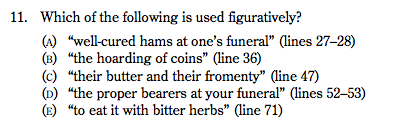
Example 2: Interpreting

#4: Literary Technique
These questions involve identifying why an author does what they do , from using a particular phrase to repeating certain words. Basically, what techniques is the author using to construct the passage/poem, and to what effect?
You can identify these questions by words/phrases such as "serves chiefly to," "effect," "evoke," and "in order to." A good way to approach these questions is to ask yourself: so what? Why did the author use these particular words or this particular structure?

#5: Character Analysis
These questions ask you to describe something about a character . You can spot them because they will refer directly to characters' attitudes, opinions, beliefs, or relationships with other characters .
This is, in many ways, a special kind of inference question , since you are inferring the broader personality of the character based on the evidence in a passage. Also, these crop up much more commonly for prose passages than they do for poetry ones.

#6: Overall Passage Questions
Some questions ask you to identify or describe something about the passage or poem as a whole : its purpose, tone, genre, etc. You can identify these by phrases such as "in the passage" and "as a whole."
To answer these questions, you need to think about the excerpt with a bird's-eye view . What is the overall picture created by all the tiny details?

#7: Structure
Some AP Lit questions will ask you about specific structural elements of the passage: a shift in tone, a digression, the specific form of a poem, etc . Often these questions will specify a part of the passage/poem and ask you to identify what that part is accomplishing.
Being able to identify and understand the significance of any shifts —structural, tonal, in genre, and so on—will be of key importance for these questions.


#8: Grammar/Nuts & Bolts
Very occasionally you will be asked a specific grammar question , such as what word an adjective is modifying. I'd also include in this category super-specific questions such as those that ask about the meter of a poem (e.g., iambic pentameter).
These questions are less about literary artistry and more about the fairly dry technique involved in having a fluent command of the English language .
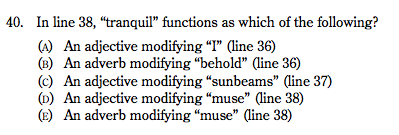
That covers the eight question types on the multiple-choice section. Now, let's take a look at the free-response section of the AP Literature exam.

Keep track of the nuts and bolts of grammar.
Section II: Free Response
The AP Literature Free Response section is two hours long and involves three free-response essay questions , so you'll have about 40 minutes per essay. That's not a lot of time considering this section of the test counts for 55% of your overall exam grade !
Note, though, that no one will prompt you to move from essay to essay, so you can theoretically divide up the time however you want. Just be sure to leave enough time for each essay! Skipping an essay, or running out of time so you have to rush through one, can really impact your final test score.
The first two essays are literary analysis essays of specific passages, with one poem and one prose excerpt. The final essay is an analysis of a given theme in a work selected by you , the student.
Essays 1 & 2: Literary Passage Analysis
For the first two essays, you'll be presented with an excerpt and directed to analyze the excerpt for a given theme, device, or development . One of the passages will be poetry, and one will be prose. You will be provided with the author of the work, the approximate date, and some orienting information (i.e., the plot context of an excerpt from a novel).
Below are some sample questions from the 2022 Free Response Questions .

Essay 3: Thematic Analysis
For the third and final essay, you'll be asked to discuss a particular theme in a work that you select . You will be provided with a list of notable works that address the given theme below the prompt, but you can also choose to discuss any "work of literary merit."
So while you do have the power to choose which work you wish to write an essay about , the key words here are "literary merit." That means no genre fiction! Stick to safe bets like authors in the list on pages 10-11 of the old 2014 AP Lit Course Description .
(I know, I know—lots of genre fiction works do have literary merit and Shakespeare actually began as low culture, and so on and so forth. Indeed, you might find academic designations of "literary merit" elitist and problematic, but the time to rage against the literary establishment is not your AP Lit test! Save it for a really, really good college admissions essay instead .)
Here's a sample question from 2022:
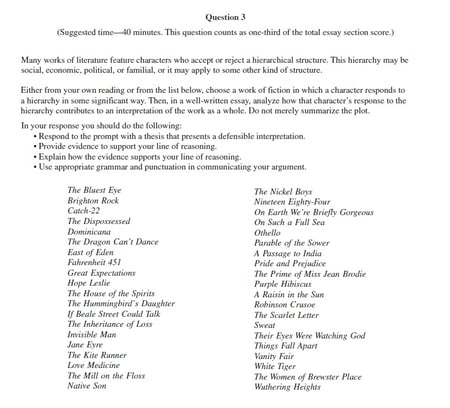
As you can see, the list of works provided spans many time periods and countries : there are ancient Greek plays ( Antigone ), modern literary works (such as Margaret Atwood's The Handmaid's Tale ), Shakespeare plays ( The Tempest ), 19th-century English plays ( The Importance of Being Earnest ), etc. So you have a lot to work with!
Also note that you can choose a work of "comparable literary merit." That means you can select a work not on this list as long as it's as difficult and meaningful as the example titles you've been given. So for example, Jane Eyre or East of Eden would be great choices, but Twilight or The Hunger Games would not.
Our advice? If you're not sure what a work of "comparable literary merit" is, stick to the titles on the provided list .

You might even see something by this guy.
How Is the AP Literature Test Graded?
The multiple-choice section of the exam comprises 45% of your total exam score; the three essays, or free-response section, comprise the other 55%. Each essay, then, is worth about 18% of your grade.
As on other AP exams, your raw score will be converted to a score from 1-5 . You don't have to get every point possible to get a 5 by any means. In 2022, 16.9% of students received 5s on the AP English Literature test, the 14th highest 5 score out of the 38 different AP exams.
So, how do you calculate your raw scores?
Multiple-Choice Scoring
For the multiple-choice section, you receive 1 point for each question you answer correctly . There's no guessing penalty, so you should answer every question—but guess only after you're able to eliminate any answer you know is wrong to up your chances of choosing the right one.
Free-Response Scoring
Scoring for multiple choice is pretty straightforward; however, essay scoring is a little more complicated.
Each of your essays will receive a score from 0 to 6 based on the College Board rubric , which also includes question-specific rubrics. All the rubrics are very similar, with only minor differences between them.
Each essay rubric has three elements you'll be graded on:
- Thesis (0-1 points)
- Evidence and Commentary (0-4 points)
- Sophistication (0-1 points)
We'll be looking at the current rubric for the AP Lit exam , which was released in September 2019, and what every score means for each of the three elements above:
To get a high-scoring essay in the 5-6 point range, you'll need to not only come up with an original and intriguing argument that you thoroughly support with textual evidence, but you’ll also need to stay focused, organized, and clear. And all in just 40 minutes per essay!
If getting a high score on this section sounds like a tall order, that's because it is.

Practice makes perfect!
Skill-Building for Success on the AP Literature Exam
There are several things you can do to hone your skills and best prepare for the AP Lit exam.
Read Some Books, Maybe More Than Once
One of the most important steps you can take to prepare for the AP Literature and Composition exam is to read a lot and read well . You'll be reading a wide variety of notable literary works in your AP English Literature course, but additional reading will help you further develop your analytical reading skills .
I suggest checking out this list of notable authors in the 2014 AP Lit Course Description (pages 10-11).
In addition to reading broadly, you'll want to become especially familiar with the details of four to five books with different themes so you'll be prepared to write a strong student-choice essay. You should know the plot, themes, characters, and structural details of these books inside and out.
See my AP English Literature Reading List for more guidance.
Read (and Interpret) Poetry
One thing students might not do very much on their own time but that will help a lot with AP Lit exam prep is to read poetry. Try to read poems from a lot of eras and authors to get familiar with the language.
We know that poetry can be intimidating. That's why we've put together a bunch of guides to help you crack the poetry code (so to speak). You can learn more about poetic devices —like imagery and i ambic pentameter —in our comprehensive guide. Then you can see those analytical skills in action in our expert analysis of " Do not go gentle into that good night " by Dylan Thomas.
When you think you have a grip on basic comprehension, you can then move on to close reading (see below).
Hone Your Close Reading and Analysis Skills
Your AP class will likely focus heavily on close reading and analysis of prose and poetry, but extra practice won't hurt you. Close reading is the ability to identify which techniques the author is using and why. You'll need to be able to do this both to gather evidence for original arguments on the free-response questions and to answer analytical multiple-choice questions.
Here are some helpful close reading resources for prose :
- University of Wisconsin-Madison Writing Center's guide to close reading
- Harvard College Writing Center's close reading guide
- Purdue OWL's article on steering clear of close reading "pitfalls"
And here are some for poetry :
- University of Wisconsin-Madison's poetry-reading guide
- This guide to reading poetry at Poets.org (complete with two poetry close readings)
- Our own expert analyses of famous poems, such as " Ozymandias ", and the 10 famous sonnets you should know
Learn Literary and Poetic Devices
You'll want to be familiar with literary terms so that any test questions that ask about them will make sense to you. Again, you'll probably learn most of these in class, but it doesn't hurt to brush up on them.
Here are some comprehensive lists of literary terms with definitions :
- The 31 Literary Devices You Must Know
- The 20 Poetic Devices You Must Know
- The 9 Literary Elements You'll Find In Every Story
- What Is Imagery?
- Understanding Assonance
- What Is Iambic Pentameter in Poetry?
- Simile vs Metaphor: The 1 Big Difference
- 10 Personification Examples in Poetry, Literature, and More
Practice Writing Essays
The majority of your grade on the AP English Lit exam comes from essays, so it's critical that you practice your timed essay-writing skills . You of course should use the College Board's released free-response questions to practice writing complete timed essays of each type, but you can also practice quickly outlining thorough essays that are well supported with textual evidence.
Take Practice Tests
Taking practice tests is a great way to prepare for the exam. It will help you get familiar with the exam format and overall experience . You can get sample questions from the Course and Exam Description , the College Board website , and our guide to AP English Lit practice test resources .
Be aware that the released exams don't have complete slates of free-response questions, so you might need to supplement these with released free-response questions .
Since there are three complete released exams, you can take one toward the beginning of your prep time to get familiar with the exam and set a benchmark, and one toward the end to make sure the experience is fresh in your mind and to check your progress.

Don't wander like a lonely cloud through your AP Lit prep.
AP Literature: 6 Critical Test-Day Tips
Before we wrap up, here are my six top tips for AP Lit test day:
- #1: On the multiple-choice section, it's to your advantage to answer every question. If you eliminate all the answers you know are wrong before guessing, you'll raise your chances of guessing the correct one.
- #2: Don't rely on your memory of the passage when answering multiple-choice questions (or when writing essays, for that matter). Look back at the passage!
- #3: Interact with the text : circle, mark, underline, make notes—whatever floats your boat. This will help you retain information and actively engage with the passage.
- #4: This was mentioned above, but it's critical that you know four to five books well for the student-choice essay . You'll want to know all the characters, the plot, the themes, and any major devices or motifs the author uses throughout.
- #5: Be sure to plan out your essays! Organization and focus are critical for high-scoring AP Literature essays. An outline will take you a few minutes, but it will help your writing process go much faster.
- #6: Manage your time on essays closely. One strategy is to start with the essay you think will be the easiest to write. This way you'll be able to get through it while thinking about the other two essays.

And don't forget to eat breakfast! Apron optional.
AP Literature Exam: Key Takeaways
The AP Literature exam is a three-hour test that includes an hour-long multiple-choice section based on five prose and poetry passages and with 55 questions, and a two-hour free-response section with three essays : one analyzing a poetry passage, one analyzing a prose passage, and one analyzing a work chosen by you, the student.
The multiple-choice section is worth 45% of your total score , and the free-response section is worth 55% . The three essays are each scored on a rubric of 0-6, and raw scores are converted to a final scaled score from 1 to 5.
Here are some things you can do to prepare for the exam:
- Read books and be particularly familiar with four to five works for the student-choice essays
- Read poetry
- Work on your close reading and analysis skills
- Learn common literary devices
- Practice writing essays
- Take practice tests!
On test day, be sure to really look closely at all the passages and really interact with them by marking the text in a way that makes sense to you. This will help on both multiple-choice questions and the free-response essays. You should also outline your essays before you write them.
With all this in mind, you're well on your way to AP Lit success!
What's Next?
If you're taking other AP exams this year, you might be interested in our other AP resources: from the Ultimate Guide to the US History Exam , to the Ultimate AP Chemistry Study Guide , to the Best AP Psychology Study Guide , we have tons of articles on AP courses and exams for you !
Looking for practice exams? Here are some tips on how to find the best AP practice tests . We've also got comprehensive lists of practice tests for AP Psychology , AP Biology , AP Chemistry , and AP US History .
Deciding which APs to take? Take a look through the complete list of AP courses and tests , read our analysis of which AP classes are the hardest and easiest , and learn how many AP classes you should take .

Ellen has extensive education mentorship experience and is deeply committed to helping students succeed in all areas of life. She received a BA from Harvard in Folklore and Mythology and is currently pursuing graduate studies at Columbia University.
Student and Parent Forum
Our new student and parent forum, at ExpertHub.PrepScholar.com , allow you to interact with your peers and the PrepScholar staff. See how other students and parents are navigating high school, college, and the college admissions process. Ask questions; get answers.

Ask a Question Below
Have any questions about this article or other topics? Ask below and we'll reply!
Improve With Our Famous Guides
- For All Students
The 5 Strategies You Must Be Using to Improve 160+ SAT Points
How to Get a Perfect 1600, by a Perfect Scorer
Series: How to Get 800 on Each SAT Section:
Score 800 on SAT Math
Score 800 on SAT Reading
Score 800 on SAT Writing
Series: How to Get to 600 on Each SAT Section:
Score 600 on SAT Math
Score 600 on SAT Reading
Score 600 on SAT Writing
Free Complete Official SAT Practice Tests
What SAT Target Score Should You Be Aiming For?
15 Strategies to Improve Your SAT Essay
The 5 Strategies You Must Be Using to Improve 4+ ACT Points
How to Get a Perfect 36 ACT, by a Perfect Scorer
Series: How to Get 36 on Each ACT Section:
36 on ACT English
36 on ACT Math
36 on ACT Reading
36 on ACT Science
Series: How to Get to 24 on Each ACT Section:
24 on ACT English
24 on ACT Math
24 on ACT Reading
24 on ACT Science
What ACT target score should you be aiming for?
ACT Vocabulary You Must Know
ACT Writing: 15 Tips to Raise Your Essay Score
How to Get Into Harvard and the Ivy League
How to Get a Perfect 4.0 GPA
How to Write an Amazing College Essay
What Exactly Are Colleges Looking For?
Is the ACT easier than the SAT? A Comprehensive Guide
Should you retake your SAT or ACT?
When should you take the SAT or ACT?
Stay Informed
Get the latest articles and test prep tips!
Looking for Graduate School Test Prep?
Check out our top-rated graduate blogs here:
GRE Online Prep Blog
GMAT Online Prep Blog
TOEFL Online Prep Blog
Holly R. "I am absolutely overjoyed and cannot thank you enough for helping me!”
What are your chances of acceptance?
Calculate for all schools, your chance of acceptance.
Your chancing factors
Extracurriculars.
Ultimate Guide to the AP English Literature and Composition Exam
Do you know how to improve your profile for college applications.
See how your profile ranks among thousands of other students using CollegeVine. Calculate your chances at your dream schools and learn what areas you need to improve right now — it only takes 3 minutes and it's 100% free.
The English Literature and Composition exam is one of the most popular AP exams among self-studiers and enrolled students alike. In 2019, a total of 380,136 students took the AP Literature exam, making it the third most favored AP exam, trailing only English Language and U.S. History in popularity. If you are interested in taking the AP Literature exam—and are taking a class or self-studying—read on for a breakdown of the test and CollegeVine’s advice for how to best prepare for it.
When is the AP Literature Exam?
2020’s AP English Literature and Composition exam day is Wednesday, May 6, 2020 at 8 AM. Check out our blog 2020 AP Exam Schedule: Everything You Need to Know to learn more about this year’s AP exam dates and times.
What Does the AP Literature Exam Cover?
The AP Literature course engages students in careful reading and critical analysis of fictional literature, leading to a deeper understanding of the ways in which writers provide both meaning and pleasure to their readers—considering structure, style, theme, and smaller-scale elements such as figurative language, imagery, symbolism, and tone.
Although there is no required reading list, the College Board formerly provided a list of prospective authors in its past AP Literature course description. Regardless of which specific titles are read in preparation for the exam, students should be familiar with works from both British and American authors written from the 16th century to the present. Ten of the commonly studied works in AP Literature courses are:
- Great Expectations , Charles Dickens
- Invisible Man , Ralph Ellison
- Beloved , Toni Morrison
- King Lear , William Shakespeare
- Heart of Darkness , Joseph Conrad
- The Portrait of a Lady , Henry James
- Wuthering Heights , Emily Bronte
- Their Eyes Were Watching God , Zora Neale Hurston
- To Kill a Mockingbird , Harper Lee
- A Portrait of the Artist as a Young Man , James Joyce
How Long is the AP Literature Exam? What is the Format?
The AP Literature exam is one of the longer AP exams, clocking in at 3 hours. It is comprised of two sections.
Section 1: Multiple Choice
1 hour | 45 Questions | 45% of Score
The first section of the AP Literature exam is one hour long and consists of 45 multiple-choice questions—23-25 Reading questions and 20-22 Writing questions. The multiple-choice questions are grouped in five sets of questions, with each set linked to a passage of prose fiction or poetry that contains between 8 and 13 questions. Students receive two sets of questions about both prose fiction and poetry, with the fifth set varying between prose fiction and poetry. The function of the multiple choice section is to assess a student’s ability to:
1. Understand and interpret word choice, comparisons, and figurative language
This is one of the most common questions types on the AP Lit exam. Students are frequently asked to infer the meaning of certain words and phrases, and how they impact the rest of the passage. You will also be asked to identify and interpret figurative language.
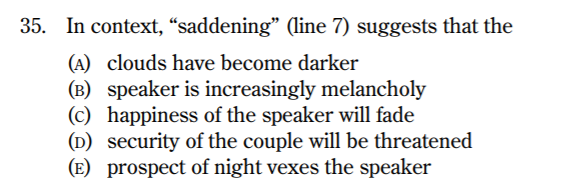
Source: The College Board
2. Understand the theme of the poem or passage
You should be able to summarize and articulate what the excerpt is about and what sort of message it conveys.

3. Paraphrase or reformulate selected lines from the passage
Students are tested on their reading comprehension by being asked to select the reformulated response that most closely aligns with the original excerpt.

4. Explain the function of…
- The narrator or speaker: Know how a narrator’s or speaker’s perspective controls the details and emphases that affect how readers experience and interpret a text.

- Characters : Grasp how characters allow the reader to explore values, beliefs, assumptions, biases, and cultural norms.

- The plot and structure : Understand what the author conveys by the arrangement of the sections of text, their relationship to each other, and sequence, along with how the reader’s interpretation of the text is affected by these choices.

- Symbols and motifs : Describe the purpose of symbols and motifs and how they contribute to the meaning of the passage.

5. Identify parts of speech, verse forms, and meters
You’ll occasionally need more technical knowledge of parts of speech (adjective, adverb, etc.) and verse forms (blank verse, free verse, sonnet, etc.). You should also have a basic knowledge of poetic meter (iambic pentameter, trochaic tetrameter, etc).

Section 2: Free Response
2 hours 15 minutes | 3 questions | 55% of Score
The second section of the AP Literature exam is two hours (plus a 15-minute reading period) and contains three free response questions. These prompts test three core abilities:
- A literary analysis of a poem
- A literary analysis of a piece of prose fiction (this may include drama)
- An analysis that examines a specific concept, issue, or element in a meritorious literary work selected by the student.
The free response essays are graded by college and AP Lit teachers following a standardized rubric.
Below are 3 example free response questions from 2019’s AP Literature Exam:
1. “Carefully read P. K. Page’s 1943 poem “The Landlady.” Then, in a well-organized essay, analyze the speaker’s complex portrayal of the landlady. You may wish to consider such elements as imagery, selection of detail, and tone.”
2. “Carefully read the following excerpt from William Dean Howells’ novel The Rise of Silas Lapham (1885). Then, in a well-constructed essay, analyze how the author portrays the complex experience of two sisters, Penelope and Irene, within their family and society. You may wish to consider such literary elements as style, tone, and selection of detail.”
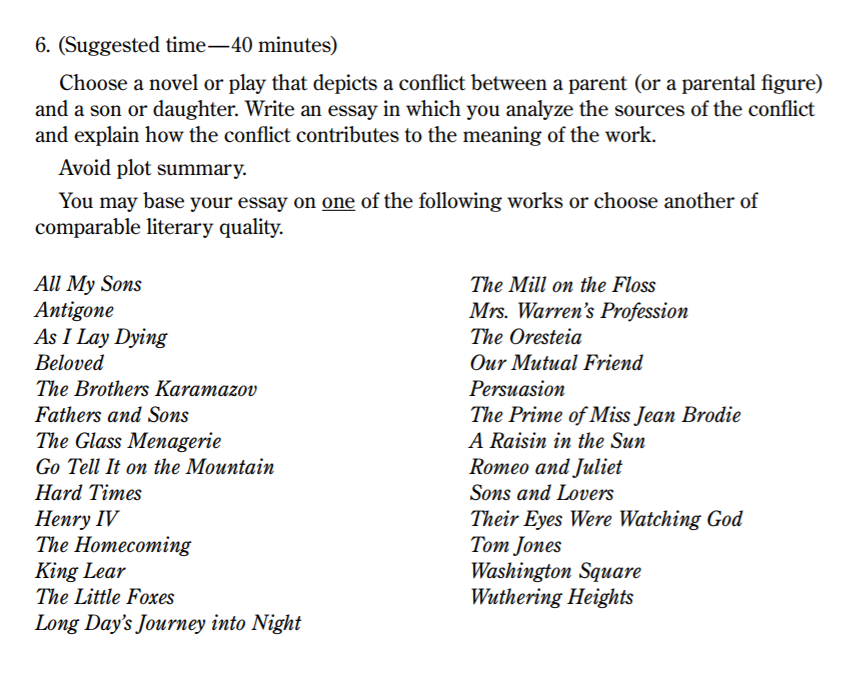
AP Literature Exam Score Distribution, Average Score, and Passing Rate
The AP Literature exam is extremely challenging, with less than half (49.7%) of students achieving a passing score of 3 or higher. The average student score is 2.62—only Physics (2.51) and Human Geography (2.55) have lower average scores. If you’re curious about other score distributions, see our post Easiest and Hardest AP Exams .
Best Ways to Study for the AP Literature Exam
One of the first steps you should take when preparing for the AP Literature exam is to look at its full course description . This will help guide your studying and understanding of the knowledge required for the AP Literature exam. Below are a few more steps you can take to ace the AP Literature exam.
Step 1: Assess Your Skills
Practice Questions and Tests: Take a practice test to assess your initial knowledge. The College Board’s AP English Literature Course and Exam Description offers some sample multiple-choice questions, and the College Board also provides six sample AP Lit free-response questions with scoring commentaries . Older versions of the AP English Literature exam are also available; you can find a copy of the 2012 AP Lit exam and the 1999 AP Lit exam . Search around the web and you’ll likely turn up even more practice exams with answers keys —some will even have explanations of the questions. You’ll also find practice tests in many of the official study guides, and some even include a diagnostic test to act as your initial assessment.
Identify Areas in Need of Improvement: Once you have taken some kind of formative assessment, score it to identify your areas of strength and areas in need of improvement. It can be helpful to have a friend (or even better, a teacher) score your free-response essays, since they are more subjective than the multiple-choice section. With an accurate formative assessment, you’ll have a better idea of where to focus your studying efforts.
Step 2: Know Your Material
In the case of the AP Literature exam, this means focusing on your reading and writing skills.
Become an Active Reader: When reading, take care to go slowly and reread important or complex sections. Pause often to consider meaning, context, and intent. Become an active reader, underlining and taking notes as you go. Remember that the importance of the text comes not only from the author, but also from how the text affects you, the reader. Pay attention to how you feel and why you feel that way. Visit the College Board’s Reading Study Skills for more information.
Write Frequently: Prepare for the writing section of your exam by writing frequently. According to the College Board, the goal is to become a “practiced, logical, clear, and honest” writer through the writing process. This means that you will plan, draft, review, redraft, edit, and polish your writing again and again. To be a successful writer on your exam, you will need to organize your ideas ahead of time, use your text wisely to support a clearly stated thesis, and provide a logical argument. Finally, you should pay close attention to your use of grammar, vocabulary, and sentence structure. Visit the College Board’s Writing Study Skills for more information.
Get Expert Advice: For more specific guidance about test preparation, consider using a formal study guide. One good choice is Barron’s AP English Literature and Composition, 6th Edition . This study guide contains a review of test topics covering details test takers need to know about poetry, fiction, and drama, and includes five full-length practice tests. Some users do criticize it for providing few examples of scored student essays, but plenty of those are available on the College Board scoring examples page .
The Princeton Review’s Cracking the AP English Language & Composition Exam, 2020 Edition: Proven Techniques to Help You Score a 5 is another solid choice containing a summary of test strategies and a focused review of course content.
Alternatively, there are many online study resources available. Some AP teachers have even published their own study guides or review sheets online. You can find one such guide here .
Consider using an app to study: A convenient way to study is to use one of the recently-developed apps for AP exams. These can be free or cost a small fee, and they provide an easy way to quiz yourself on-the-go. Make sure you read reviews before choosing one—their quality varies widely. One that does receive good reviews is the McGraw Hill 5 which also saves you some money by covering 14 different AP subjects.
Step 3: Practice Multiple-Choice Questions
Once you have your theory down, test it out by practicing multiple-choice questions. You can find these in most study guides or through online searches. There are some available in the College Board’s course description.
Try to keep track of which concept areas are still tripping you up, and go back over this theory again. Keep in mind that the key to answering questions correctly is understanding the passage, so practice active reading skills as you’re tackling the multiple-choice questions. This includes underlining, mouthing words, and circling key points. Remember, the answer will always be found in the text, and often the question will tell you exactly where in the text to look for it.
Step 4: Practice Free-Response Essays
Focus on Writing Skills: Use a rich vocabulary, varied sentence structure, and logical progression of ideas. Make sure that your words flow easily from one to the next. According to the College Board’s scoring criteria , writing that suffers from grammatical and/or mechanical errors that interfere with communication cannot earn a the maximum score of a 6, no matter how strong your thesis, compelling your argument, or convincing your evidence is.
Cultivate Cohesive Writing: You should also strive to write a thoughtful and persuasive analysis of the literature. Begin by writing a quick outline to structure your piece. Make sure that your introduction leads to a clearly stated thesis and use supporting paragraphs to build this argument. Use quotes judiciously in your answers and focus on writing with sophistication and clarity.
Practice, Practice, Practice: The best way to prepare for these free-response questions is through repeated exercises analyzing short prose passages and poems, and through practicing with open analytical questions.
Understand Scoring: As you prepare for the writing portion of your exam, be sure to review how your free responses will be scored. Each free-response essay is graded on a scale from 0 to 6 with points awarded for three elements: Thesis (0-1 point), Evidence and Commentary (0-4 points), and Sophistication (0-1 point). A comprehensive explanation of the College Board’s scoring rubric is found on their website.
Study the free-response questions and scored student responses with written explanations provided by the College Board . The most effective way to use these is to read and respond to the prompts first, then review the student samples and scoring explanations. Use this feedback to practice another prompt and repeat the cycle until you are confident that your responses are as strong as the top scorers’.
Step 5: Take Another Practice Test
As you did at the beginning of your studying, take a practice test to see which areas you’ve improved in and which still require practice.
If you have time, repeat each of the steps above to incrementally increase your score.
Step 6: Exam Day Specifics
If you’re taking the AP course associated with this exam, your teacher will walk you through how to register. If you’re self-studying, check out CollegeVine’s How to Self-Register for AP Exams .
For information about what to bring to the exam, see CollegeVine’s What Should I Bring to My AP Exam (And What Should I Definitely Leave at Home)?
CollegeVine can’t predict how you’ll score on your AP Literature exam, but we can help take the guesswork out of college admissions. Our free chancing engine uses a data-driven algorithm taking into consideration criteria such as GPA, standardized test scores, and extracurricular activities to tell you your odds of acceptance at over 500 colleges and universities.
Check out these other Collegevine articles for more information about AP exams.
- 2020 AP Exam Schedule
- How Long is Each AP Exam?
Want access to expert college guidance — for free? When you create your free CollegeVine account, you will find out your real admissions chances, build a best-fit school list, learn how to improve your profile, and get your questions answered by experts and peers—all for free. Sign up for your CollegeVine account today to get a boost on your college journey.
Related CollegeVine Blog Posts


IMAGES
VIDEO
COMMENTS
Download free-response questions from past exams along with scoring guidelines, sample responses from exam takers, and scoring distributions. If you are using assistive technology and need help accessing these PDFs in another format, contact Services for Students with Disabilities at 212-713-8333 or by email at [email protected].
AP® English Literature and Composition 2022 Scoring Guidelines. Question 3: Literary Argument 6 points . Many works of literature feature characters who accept or reject a hierarchical structure. This hierarchy may be social, economic, political, or familial, or it may apply to some other kind of structure.
2017 Q 3: Character of unusual or mysterious origins Essay A Refer to my answer in prompt 2. # Essay B Mice of Men had a few characters whose origins were unusual and mysterious. The character who gets killed at the end was very mysterious and weird. This shaped the character because he needed to be weird to make the novel better.
In this video, we'll unpack a sample free-response question—FRQ (Question 3: Literary Argument).Download questions here: https://tinyurl.com/4bpjvzj4Stay mot...
in which you consider the following: (1) What the character's illusion is and how it differs from reality as presented in the play. (2) How the destruction or perpetuation of the illusion develops a theme of the play. Macbeth, Frankenstein, 1984, A Streetcar Named Desire, The Kite Runner.
Essays scored a 3 may contain significant misreading and/or demonstrate inept writing. 2-1 Although these essays make some attempt to respond to the prompt, they compound the weaknesses of the papers in the 4-3 range. Often, they are unacceptably brief or incoherent in presenting their ideas. They may be poorly written on several counts and ...
I love teaching Question 3, the Literary Argument Essay, of the AP English Literature Exam. I thoroughly enjoy seeing one beautifully written novel wrapped into a pretty little package that is the essay. My students always tell me my enthusiasm is nauseating, but to be able to eloquently condense a rich novel into such a narrow lens, is an art ...
The 2019 AP English Literature Course and Exam Description has practice multiple-choice questions and free-response questions.They don't add up to a complete test--there are only 19 multiple-choice questions instead of 55-but there are three free response questions (enough for a full test). Even though there aren't many multiple-choice ...
All FRQ #3 Open-Ended Prompts, 1970-2022. Thanks to the hard work of Sandra Effinger, all the open-ended prompts from 1970-2022 have been assembled on one page. Please see this link. This is incredibly useful as a way of building general questions about independent reading. For example, a teacher might use this resource to build independent in ...
The score should reflect the quality of the essay as a whole — its content, style, and mechanics. Reward the students for what they do well. The score for an exceptionally well-written essay may be raised by 1 point above the otherwise appropriate score. In no case may a poorly written essay be scored higher than a 3.
The AP Literature Exam is a three-hour exam that contains two sections in this order: An hour-long, 55-question multiple-choice section. A two-hour, three-question free-response section. The exam tests your ability to analyze works and excerpts of literature and cogently communicate that analysis in essay form.
AP ® English Literature and Composition 2023 Free-Response Questions . Question 3 (Suggested time—40 minutes. This question counts as one-third of the total essay section score.) In many works of literature, characters choose to reinvent themselves for significant reasons. They may wish to
Below are 3 example free response questions from 2019's AP Literature Exam: 1. "Carefully read P. K. Page's 1943 poem "The Landlady." Then, in a well-organized essay, analyze the speaker's complex portrayal of the landlady. You may wish to consider such elements as imagery, selection of detail, and tone." 2.
AP English Literature..... Romano Practice Question # The most important themes in literature are sometimes developed in scenes in which a death or deaths take place. Choose a novel or play and write a well developed essay in which you show how a specific death scene helps to illuminate the meaning of the work as a while. Avoid mere plot summary.